Abstract
Specific binding of 125I-angiotensin to high affinity glomerular receptors varies directly with the level of dietary sodium. To investigate the mechanism of sodium regulation of glomerular angiotensin receptors, groups of Sprague-Dawley rats were maintained on one of three levels of sodium intake for at least 5 d: high sodium (7.39 meq/24 h), moderate sodium (0.88 meq/24 h), and low sodium diets (0.01 meq/24 h). An additional group was given low sodium diet with daily injections of furosemide (1 mg/kg i.p.). To dissociate the effects of dietary sodium from those of circulating angiotensin II levels on glomerular receptor regulation, a fifth group was placed on high sodium diet and given a continuous infusion of angiotensin via an implanted minipump (100 ng/min) for 21 d. There was a strong negative correlation (r = -0.98, P less than 0.01) between plasma angiotensin II and glomerular angiotensin receptor density. Dietary sodium, potassium, or water consumption did not correlate with angiotensin II receptor concentration. The affinity constant did not vary in any of the groups (2.33 +/- 0.30 X 10(8) M-1). The time course of sodium regulation of glomerular angiotensin II receptors was studied in rats switched from a moderate sodium to either a high sodium diet or a low sodium diet plus furosemide. Receptor density was unchanged at 24 h, varied directly with sodium intake for 1-5 d when induction was maximal, and remained constant for at least 21 d. The time course of receptor regulation closely paralleled changes in plasma angiotensin II. Additional studies were undertaken to demonstrate that glomerular angiotensin II receptors are down-regulated by circulating hormone. Rats maintained on moderate sodium intake were killed 2 min after the induction of anesthesia with pentobarbital (50 mg/kg i.p.) or by rapid decapitation. Despite a 50-fold elevation of plasma angiotensin II in anesthetized rats (424 +/- 154 vs. 8.6 +/- 1.0 pg/ml, P less than 0.001) angiotensin receptor density was unchanged (anesthetized, 1,016 +/- 126 vs. unanesthetized, 1,290 +/- 84 fmol/mg). The infusion of angiotensin II (100 mg/min) for 15 min or 2 h into anesthetized rats maintained on moderate sodium intake resulted in a 50% reduction in specific angiotensin binding that could not be reversed by the dissociation of endogenous angiotensin. These data are compatible with modulation of receptor density by circulating hormone and can not be accounted for by prior receptor occupancy.
Full text
PDF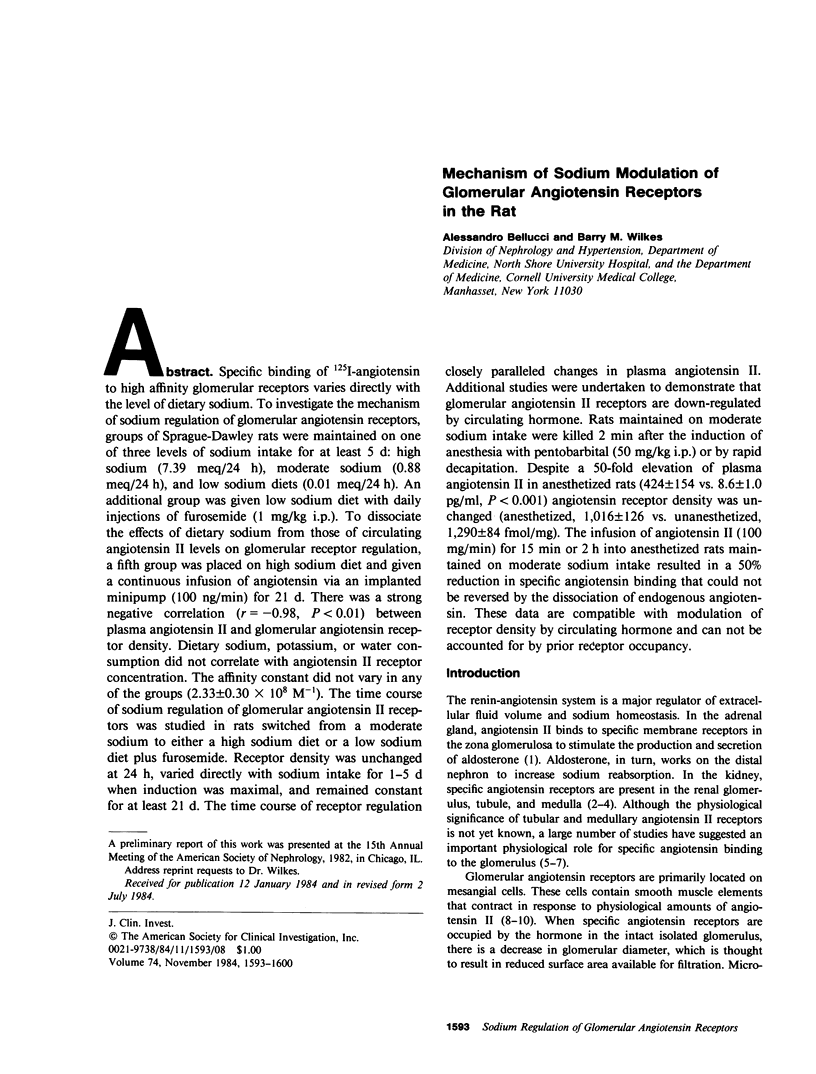
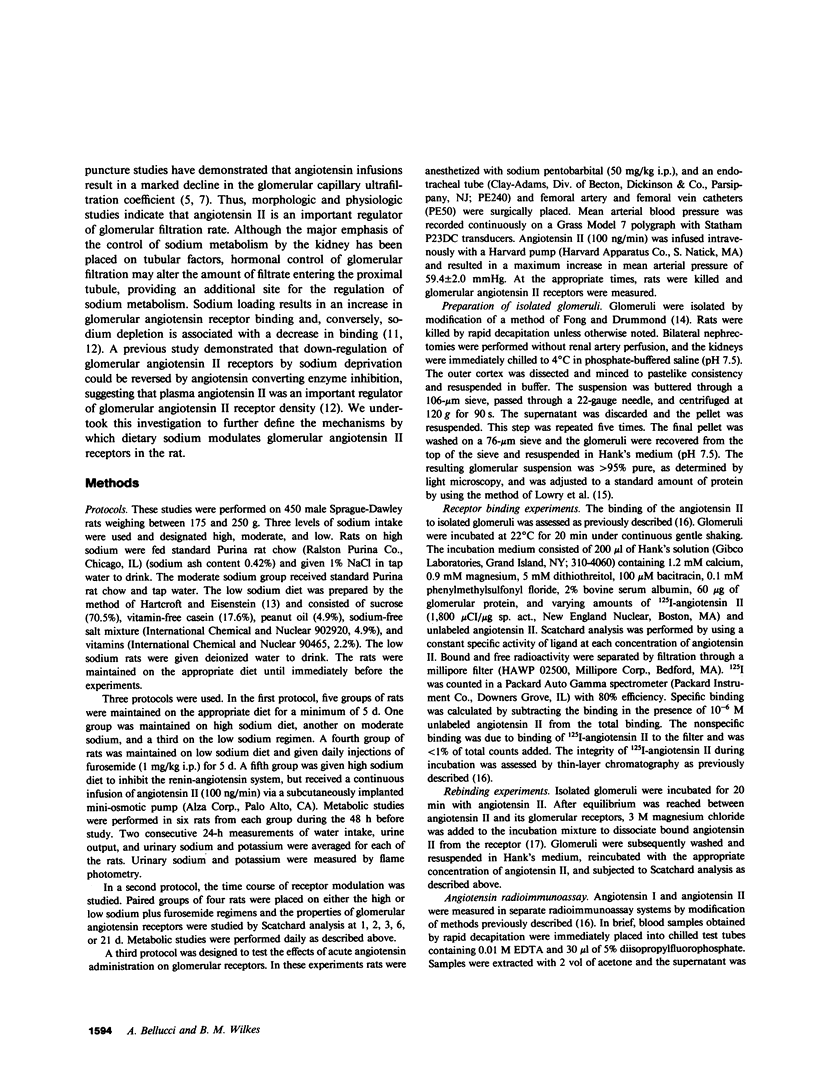
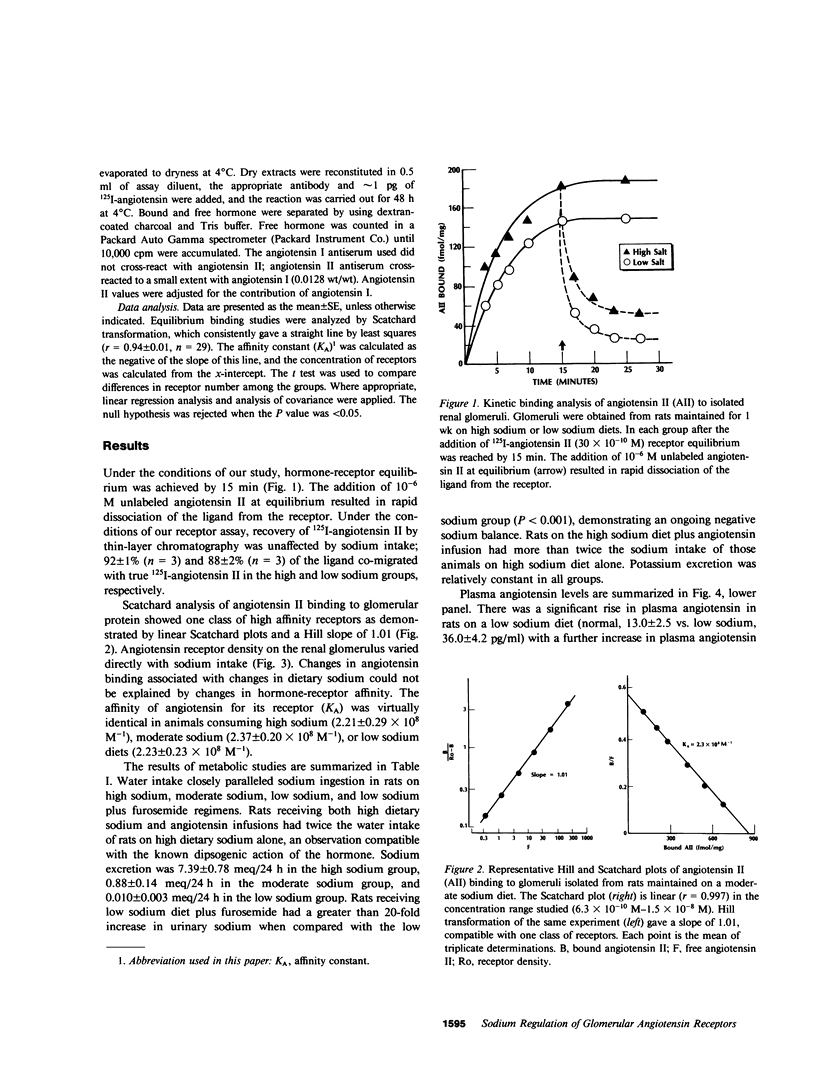
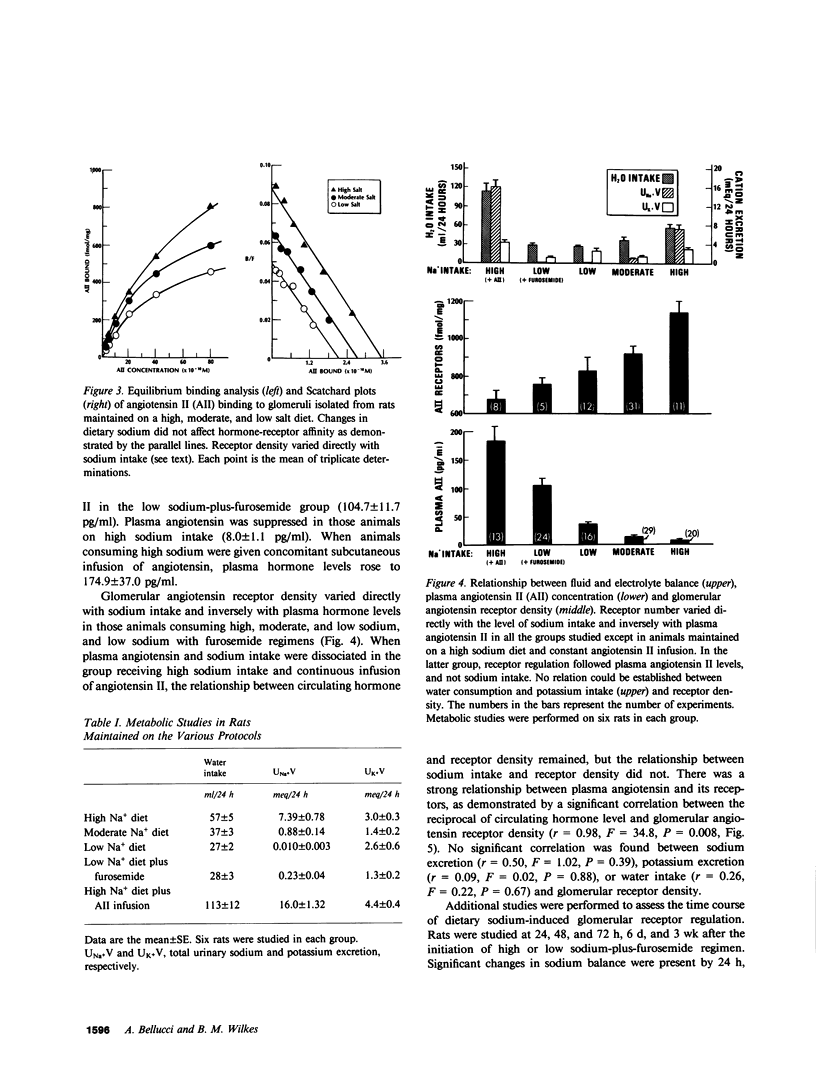
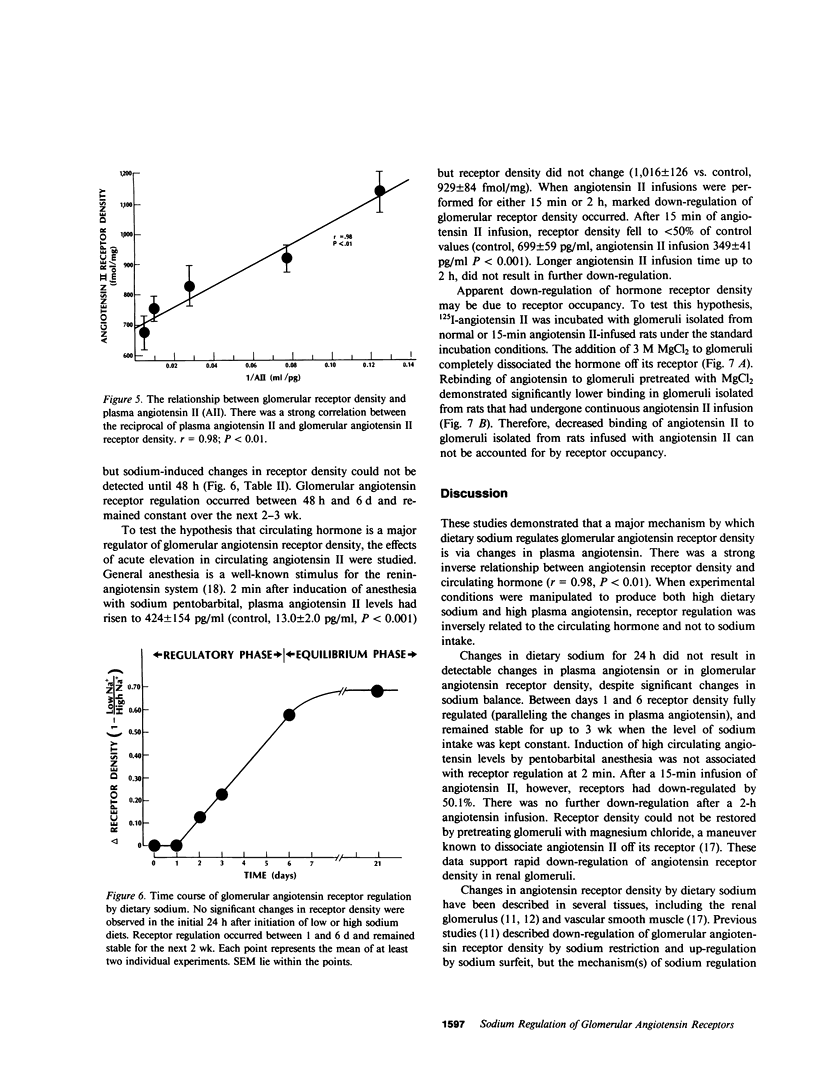
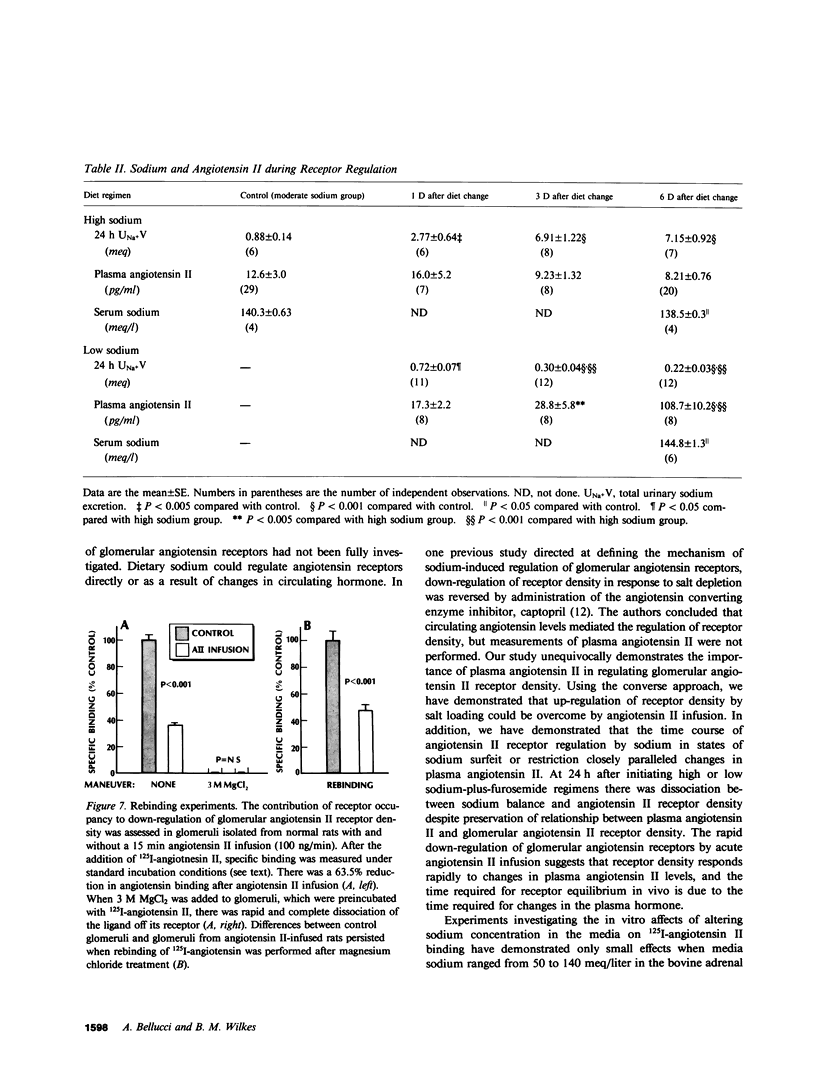
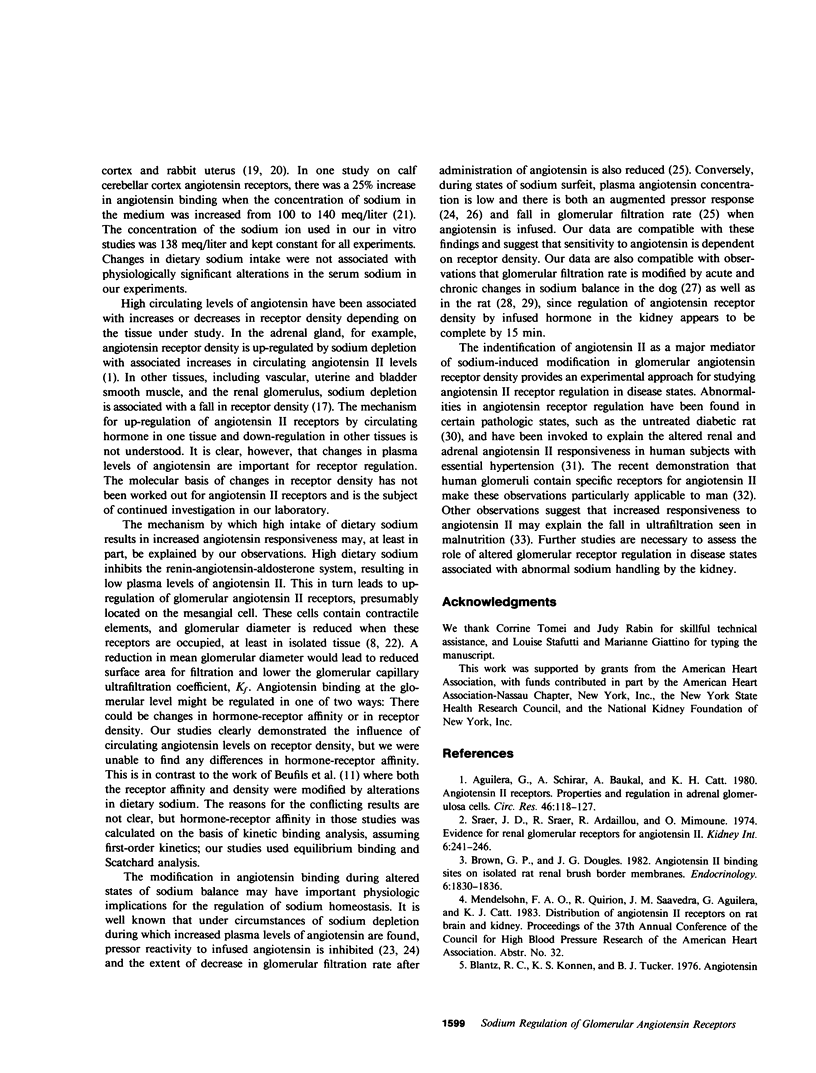
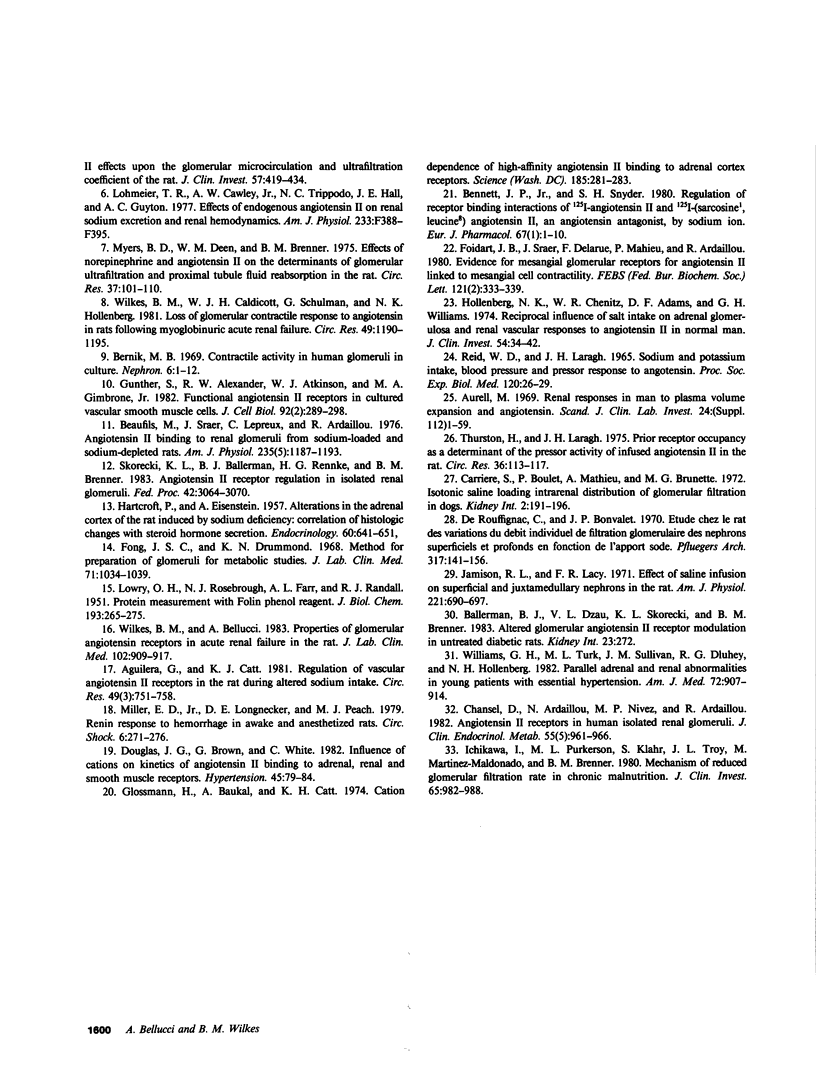
Selected References
These references are in PubMed. This may not be the complete list of references from this article.
- Aguilera G., Catt K. Regulation of vascular angiotensin II receptors in the rat during altered sodium intake. Circ Res. 1981 Sep;49(3):751–758. doi: 10.1161/01.res.49.3.751. [DOI] [PubMed] [Google Scholar]
- Aurell M. Renal response in man to plasma volume expansion and angiotensin. Scand J Clin Lab Invest Suppl. 1969;112:1–59. [PubMed] [Google Scholar]
- Beaufils M., Sraer J., Lepreux C., Ardaillou R. Angiotensin II binding to renal glomeruli from sodium-loaded and sodium-depleted rats. Am J Physiol. 1976 May;230(5):1187–1193. doi: 10.1152/ajplegacy.1976.230.5.1187. [DOI] [PubMed] [Google Scholar]
- Bennett J. P., Jr, Snyder S. H. Regulation of receptor binding interactions of 125I-angiotensin II and 125I-[sarcosine1,leucine8]angiotensin II, an angiotensin antagonist, by sodium ion. Eur J Pharmacol. 1980 Oct 3;67(1):1–10. doi: 10.1016/0014-2999(80)90002-3. [DOI] [PubMed] [Google Scholar]
- Bernik M. B. Contractile activity of human glomeruli in culture. Nephron. 1969;6(1):1–10. doi: 10.1159/000179708. [DOI] [PubMed] [Google Scholar]
- Blantz R. C., Konnen K. S., Tucker B. J. Angiotensin II effects upon the glomerular microcirculation and ultrafiltration coefficient of the rat. J Clin Invest. 1976 Feb;57(2):419–434. doi: 10.1172/JCI108293. [DOI] [PMC free article] [PubMed] [Google Scholar]
- Brown G. P., Douglas J. G. Angiotensin II binding sites on isolated rat renal brush border membranes. Endocrinology. 1982 Dec;111(6):1830–1836. doi: 10.1210/endo-111-6-1830. [DOI] [PubMed] [Google Scholar]
- Carriere S., Boulet P., Mathieu A., Brunette M. G. Isotonic saline loading and intrarenal distribution of glomerular filtration in dogs. Kidney Int. 1972 Oct;2(4):191–196. doi: 10.1038/ki.1972.94. [DOI] [PubMed] [Google Scholar]
- Chansel D., Ardaillou N., Nivez M. P., Ardaillou R. Angiotensin II receptors in human isolated renal glomeruli. J Clin Endocrinol Metab. 1982 Nov;55(5):961–966. doi: 10.1210/jcem-55-5-961. [DOI] [PubMed] [Google Scholar]
- Foidart J., Sraer J., Delarue F., Mahieu P., Ardaillou R. Evidence for mesangial glomerular receptors for angiotensin II linked to mesangial cell contractility. FEBS Lett. 1980 Dec 1;121(2):333–339. doi: 10.1016/0014-5793(80)80375-9. [DOI] [PubMed] [Google Scholar]
- Fong J. S., Drummond K. N. Method for preparation of glomeruli for metabolic studies. J Lab Clin Med. 1968 Jun;71(6):1034–1039. [PubMed] [Google Scholar]
- Glossmann H., Baukal A., Catt K. J. Cation dependence of high-affinity angiotensin II binding to adrenal cortex receptors. Science. 1974 Jul 19;185(4147):281–283. doi: 10.1126/science.185.4147.281. [DOI] [PubMed] [Google Scholar]
- Gunther S., Alexander R. W., Atkinson W. J., Gimbrone M. A., Jr Functional angiotensin II receptors in cultured vascular smooth muscle cells. J Cell Biol. 1982 Feb;92(2):289–298. doi: 10.1083/jcb.92.2.289. [DOI] [PMC free article] [PubMed] [Google Scholar]
- HARTROFT P. M., EISENSTEIN A. B. Alterations in the adrenal cortex of the rat induced by sodium deficiency: correlation of histologic changes with steroid hormone secretion. Endocrinology. 1957 May;60(5):641–651. doi: 10.1210/endo-60-5-641. [DOI] [PubMed] [Google Scholar]
- Hollenberg N. K., Chenitz W. R., Adams D. F., Williams G. H. Reciprocal influence of salt intake on adrenal glomerulosa and renal vascular responses to angiotensin II in normal man. J Clin Invest. 1974 Jul;54(1):34–42. doi: 10.1172/JCI107748. [DOI] [PMC free article] [PubMed] [Google Scholar]
- Ichikawa I., Purkerson M. L., Klahr S., Troy J. L., Martinez-Maldonado M., Brenner B. M. Mechanism of reduced glomerular filtration rate in chronic malnutrition. J Clin Invest. 1980 May;65(5):982–988. doi: 10.1172/JCI109784. [DOI] [PMC free article] [PubMed] [Google Scholar]
- Jamison R. L., Lacy F. B. Effect of saline infusion on superficial and juxtamedullary nephrons in the rat. Am J Physiol. 1971 Sep;221(3):690–697. doi: 10.1152/ajplegacy.1971.221.3.690. [DOI] [PubMed] [Google Scholar]
- LOWRY O. H., ROSEBROUGH N. J., FARR A. L., RANDALL R. J. Protein measurement with the Folin phenol reagent. J Biol Chem. 1951 Nov;193(1):265–275. [PubMed] [Google Scholar]
- Lohmeier T. E., Cowley A. W., Jr, Trippodo N. C., Hall J. E., Guyton A. C. Effects of endogenous angiotensin II on renal sodium excretion and renal hemodynamics. Am J Physiol. 1977 Nov;233(5):F388–F395. doi: 10.1152/ajprenal.1977.233.5.F388. [DOI] [PubMed] [Google Scholar]
- Miller E. D., Jr, Longnecker D. E., Peach M. J. Renin response to hemorrhage in awake and anesthetized rats. Circ Shock. 1979;6(3):271–276. [PubMed] [Google Scholar]
- Myers B. D., Deen W. M., Brenner B. M. Effects of norepinephrine and angiotensin II on the determinants of glomerular ultrafiltration and proximal tubule fluid reabsorption in the rat. Circ Res. 1975 Jul;37(1):101–110. doi: 10.1161/01.res.37.1.101. [DOI] [PubMed] [Google Scholar]
- Reid W. D., Laragh J. H. Sodium and potassium intake, blood pressure, and pressor response to angiotensin. Proc Soc Exp Biol Med. 1965 Oct;120(1):26–29. doi: 10.3181/00379727-120-30434. [DOI] [PubMed] [Google Scholar]
- Skorecki K. L., Ballermann B. J., Rennke H. G., Brenner B. M. Angiotensin II receptor regulation in isolated renal glomeruli. Fed Proc. 1983 Nov;42(14):3064–3070. [PubMed] [Google Scholar]
- Sraer J. D., Sraer J., Ardaillou R., Mimoune O. Evidence for renal glomerular receptors for angiotensin II. Kidney Int. 1974 Oct;6(4):241–246. doi: 10.1038/ki.1974.105. [DOI] [PubMed] [Google Scholar]
- Thurston H., Laragh J. H. Prior receptor occupancy as a determinant of the pressor activity of infused angiotensin II in the rat. Circ Res. 1975 Jan;36(1):113–117. doi: 10.1161/01.res.36.1.113. [DOI] [PubMed] [Google Scholar]
- Wilkes B. M., Bellucci A. Properties of glomerular angiotensin receptors in acute renal failure in the rat. J Lab Clin Med. 1983 Dec;102(6):909–917. [PubMed] [Google Scholar]
- Wilkes B. M., Caldicott W. J., Schulman G., Hollenberg N. K. Loss of the glomerular contractile response to angiotensin in rats following myohemoglobinuric acute renal failure. Circ Res. 1981 Nov;49(5):1190–1195. doi: 10.1161/01.res.49.5.1190. [DOI] [PubMed] [Google Scholar]
- Williams G. H., Tuck M. L., Sullivan J. M., Dluhy R. G., Hollenberg N. K. Parallel adrenal and renal abnormalities in young patients with essential hypertension. Am J Med. 1982 Jun;72(6):907–914. doi: 10.1016/0002-9343(82)90851-8. [DOI] [PubMed] [Google Scholar]
- de Rouffignac C., Bonvalet J. P. Etude chez le rat des variations du débit individuel de filtration glomérulaire des néphrons superficiels et profonds en fonction de l'approt sodé. Pflugers Arch. 1970;317(2):141–156. doi: 10.1007/BF00592498. [DOI] [PubMed] [Google Scholar]


